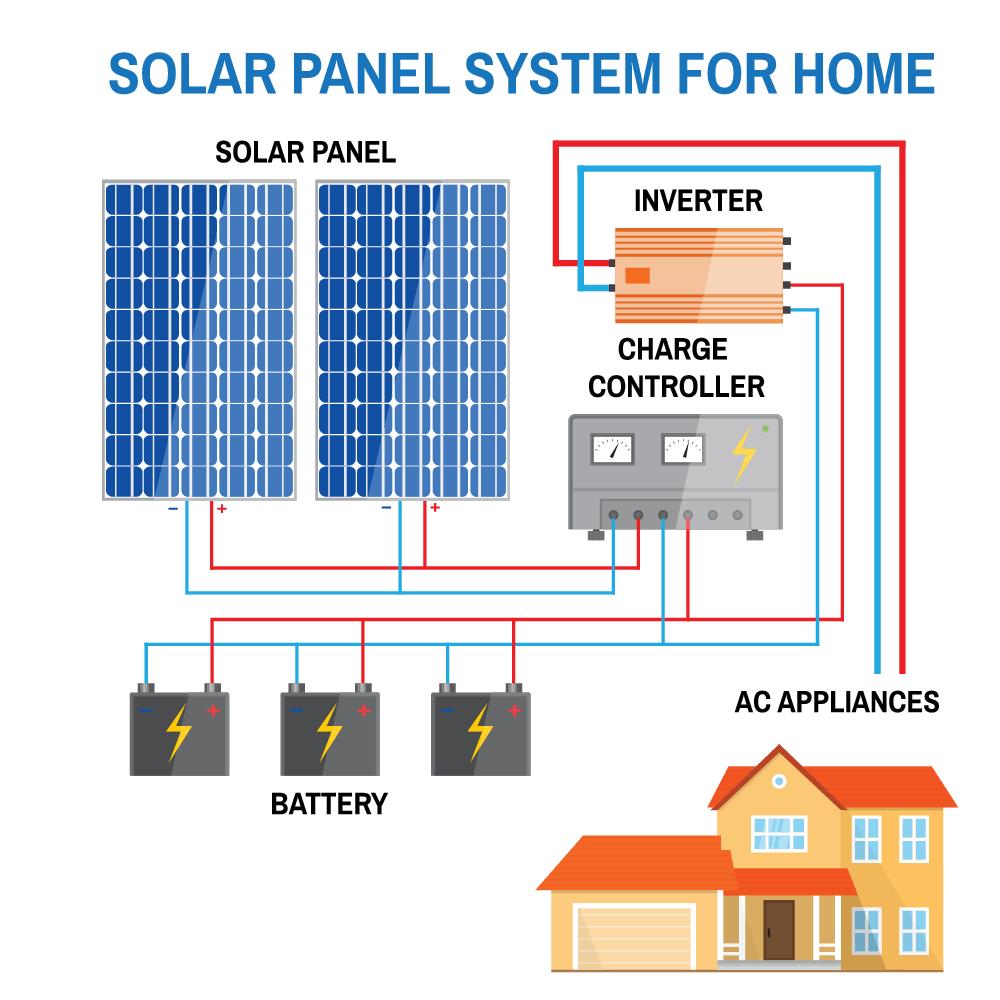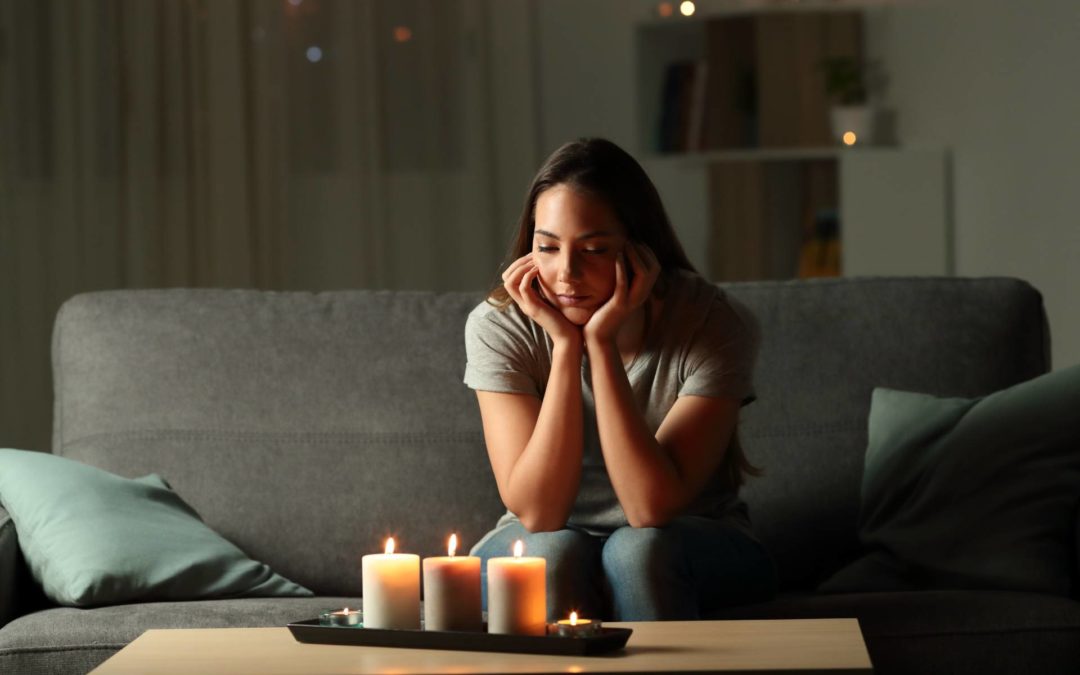You’ve got your solar system installed and it’s working perfectly. Your monthly bills have dropped dramatically, and you’ve been seeing the credits from your solar panels adding up. You’re setting aside the savings for other household needs. What could go wrong?
One dark and stormy day, during the worst thunderstorm in years, the power goes out. But you’ve got solar panels, so you’re okay, right? Wrong. Even though you’ve got solar panels, if they’re tied to the grid, they’re not supplying power. Why? That’s what we’ll talk about here.
Why Don’t They Work During a Power Outage?
If your system is grid-tied, like most home solar systems, any excess power is fed back to the grid, and you receive credits toward your monthly bill. This is fine under normal circumstances and a possible help during high demand periods. That being said, it can be a problem if the power goes out. Because your system feeds power back into the grid, if the power goes out and the panels continue to generate power out to the grid, it can be a serious safety hazard to the power crews out repairing the damage. The voltage of the power in the overhead lines is much higher than your household power but can still be extremely dangerous to anyone working on the lines. Your solar energy system has an automated shut-off that disconnects it from the grid in the event of a power failure to prevent any injuries to the repair crews.
The Power’s Out, Now What?
It depends on your situation. If you’re like most people, you’ll have to ride out the power failure until the grid is restored. This can be a major inconvenience, and possibly dangerous if you or a family member is dependent on any kind of electrically powered medical equipment.
It’s a good idea to keep extra, charged up batteries for medical equipment, charged up portable phone and laptop chargers and extra batteries for your flashlights. Aside from that, there’s not much you can do. Refrain from opening the refrigerator and freezer to keep them as cold as possible for as long as possible. If you have any ice handy, put perishable foods in an ice chest.
For lighting, camping lights and candles (be careful) can be used for emergency lighting. If it’s warm outside, try and stay as cool as possible. If it’s cold, and you have a wood or pellet stove or fireplace, use it. Just be safe and make sure it’s venting properly. If you can go somewhere that has electricity, such as a friend or family member’s home, go. Even if you have to go to a hotel or motel for the night, that’s better than being in an at risk, uncomfortable house.

Keeping the Lights On
There are things you can do to keep the power on.
- Backup Generators – You can use a backup gas powered generator. They’re not too expensive (about $1,000 or a little more for a 9,000+ watt generator) that can pretty much keep your whole house up and running until the power comes back on. Just make sure you have enough fuel handy. While your solar panels won’t be working, you’ll at least have power. The downside is that they burn fossil fuels, can be loud, can be smelly from their exhaust, and emit greenhouse gases. Plus, there’s a possible fire hazard when refilling due to the hot parts or your stored fuel can catch fire. There are quieter units that run on diesel or natural gas, but for anything but the basic version, they can get very expensive really fast. Natural gas supplies can be iffy in the event of a power failure.
- Solar Batteries – A solar battery system is a great way to keep the power on during a blackout. When the grid goes down, the battery kicks in without any fuss. Options include a bank of deep cycle lead acid batteries to the Tesla Powerwall. There are numerous options so speak to your solar energy contractor about the ones they have available. A solar plus battery system will automatically disconnect from the grid and your solar panels will continue to charge the batteries all day and discharge them as needed at night. If you have enough battery capacity, you can keep everything running, even through a long power outage.
- Solar Generators – If you’re not ready to spend the money on a whole-house battery system, a solar generator can be an economical alternative. They can be charged by the grid or your solar panels but won’t charge from your solar panels when the grid is down unless you have the same setup as a battery backup system. They’ll be able to keep your food cold and space heater going.
- A Special Inverter or Inverter System – There are inverters and inverter systems available that will disconnect your system from the grid and allow your solar panels to continue to function. These can either disconnect automatically or manually by the homeowner when the power goes out. One type will power a few appliances, such as your refrigerator and TV and a phone charger, but not much else. Another kind can keep most things running so long as the sun is shining brightly. That being said, once the sun goes down, you’re out of luck. A set up like this plus a battery backup would be a wise setup.
What to do, what to do?
Now that you know what some of the alternatives are, what you do next is up to you and your budget. If you’ve got the room in your budget, a whole-house battery system could be for you, or even a solar generator and battery backup. If not, you still have alternatives. You can get a gasoline powered generator to keep battery backup of essential appliances running and/or an inverter that allows your solar panels to continue to function. Talk to Royal Solar about our various backup systems.
We will work with you to determine what your current and possible future needs will be, what the upfront costs are and what the expected ROI can be. Once that’s determined, we’ll schedule your installation.
The peace of mind a backup system will give you will be worth the expense. You’ll feel better knowing that even if the power goes out, your food won’t spoil and you’ll be able to keep your phone charged up, at the very least. You may end up being the envy of the neighborhood since you’ll have power and everyone else is either going to a hotel or stuck in the dark. In any case, you’ll be glad you invested in a backup system, and your family will definitely be glad you did!

